#Pierre Murat
Explore tagged Tumblr posts
Text

Micheline Chassagne dite Micheline Presle (1922-2024)
1 note
·
View note
Text
A gift for myself as I've gotten to napoleonic fandom for 1000(+3) days🥰!
#napoleonic wars#napoleon bonaparte#louis alexandre berthier#geraud duroc#jean lannes#joachim murat#jean baptiste bessières#pierre augereau#andre massena#michel ney#laurent de gouvion saint cyr#auguste de marmont#edouard mortier#jean de dieu soult#jean andoche junot#jean baptiste bernadotte#dominique jean larrey#nicolas charles oudinot#louis nicolas davout#barclay de tolly#pyotr bagration#mikhail miloradovich#alexey arakcheev#alexander i of russia#mikhail speransky#sir sidney smith#talleyrand#joseph fouché#horatio nelson#arthur wellesley
256 notes
·
View notes
Text
The ends of the Marshals
We know a lot about our marshals of empires, but for some their existence ends in 1814, I did some research and I did all the dates of death of the 26 marshals of the empire with their age of death and some information that I had, do not hesitate to say other information if you have any, when we look closely Lannes was the first to die and at a young age while the one who spent the most time on earth is Moncey who lived until 87 years old, yet it is Marmont who will be the last to die in 1852, I hope that this will be useful for some.
Shot:
-Murat, October 13, 1815 (trying to recover his former kingdom of Naples …) at 48 years old
-Ney, December 7, 1815 (judged as a traitor for having joined Napoleon in 1815) at 46 years old
Defenestrate: (throw at a window)
-Berthier, June 1, 1815 (suicide or murder?) at age 61
Killed in combat:
-Lannes, May 31, 1809, wounded in the leg, dies of his wounds, at age 40
-Bessières, May 1, 1813, wounded by a cannon (no chance of survival) at age 44
-Poniatowski, October 19, 1813, drowned during the battle of Liepzig, at age 50
assassinated:
-Brune, August 2, 1815 (victim of the white terror of 1815) at age 52
-Mortier, July 28, 1835 (killed in an attack) at age 67
illness:
-Davout, June 1, 1823 (probably of tuberculosis) at age 53
-Augereau, June 12, 1816, at age 58
-Masséna, April 4, 1817 (long-term ill) at age 58
-Gouvion Saint-Cyr, March 17, 1830 (stroke) at age 65
natural causes, old age: (Here it is mainly deaths from natural causes)
-Perignon, December 25, 1818, at age 64
-Serurier, December 21, 1819, at age 77
-Lefebvre, September 4, 1820, at age 64
-Kellermann, September 14, 1820, at age 85
-Suchet, January 3, 1826, at age 55
-Jourdan, November 23, 1833, at age 71
-MacDonald, September 25, 1840, at age 74
-Victor, March 1, 1841, at age 76
-Moncey, April 20 1842, at age 87
-Bernadotte, March 8, 1844 (died of a paralytic attack at age 81)
-Grouchy, May 29, 1847, at age 80
-Oudinot, September 13, 1847, at age 80
-Soult, November 26, 1851, at age 82
-Marmont, March 2, 1852, at age 77
#history#napoleonic era#napoleon's marshals#michel ney#joachim murat#louis nicolas davout#louis alexandre berthier#jean mathieu philibert sérurier#jean lannes#jean baptiste bessières#jean baptiste jourdan#jean baptiste bernadotte#joseph antoine poniatowski#pierre augereau#claude victor perrin#jean de dieu soult#edouard mortier#nicolas charles oudinot#emmanuel grouchy#auguste de marmont#louis gabriel suchet#etienne macdonald#catherine dominique perignon#françois joseph lefebvre#françois christophe kellermann#jean mathieu philibert serurier#adrien moncey#andré masséna#laurent gouvion saint-cyr
120 notes
·
View notes
Text
Night at the marshalate fanfic fan art





Recently I've been hyperfixated on this fic that sadly has not updated for a long time but the concept interested me so much that I just needed to draw it.
I really love the movie 'night at the museum' that this fic is based off and i just love all the ideas that can come out of this. I recommend you read it yourself theres only one chapter so it isnt that much (if the writer of this fic ever sees this pls update it 😭)
I wonder how the other marshals would look like i was thinking for soult to be made out of gold ik ironic lmao
#napoleonic era#napoleonic wars#marshal davout#joachim murat#jean lannes#marshal lannes#napoleon’s marshals#marshal ney#nicolas charles oudinot#pierre françois charles augereau#night at the marshalete#ao3 fanfic
104 notes
·
View notes
Text
I drew all 26 of Napoleon's marshals
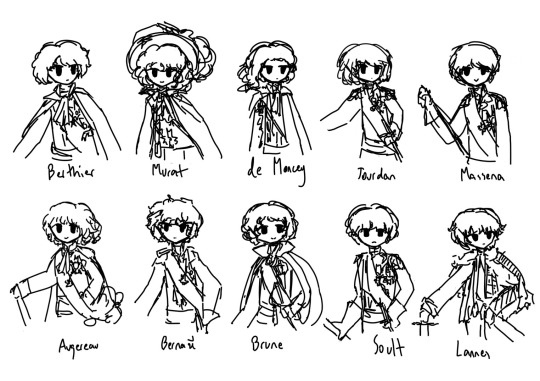
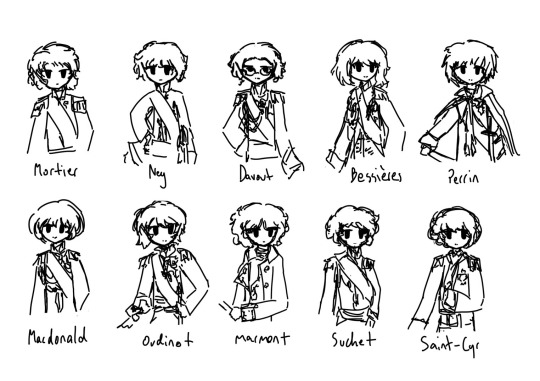
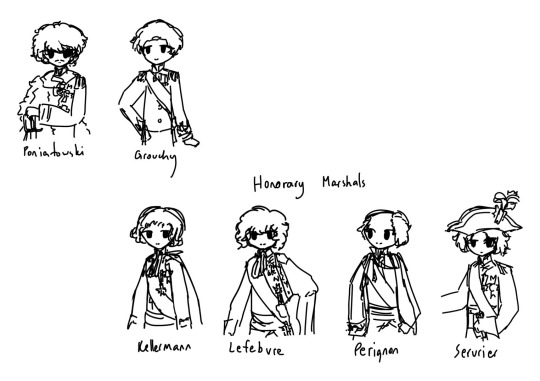
#napoleonic wars#napoleon’s marshals#do i just tag all of them#Louis-Alexandre Berthier#Joachim Murat#Bon-Adrien Jeannot de Moncey#Jean-Baptiste Jourdan#André Masséna#Pierre Augereau#Jean-Baptiste Bernadotte#Guillaume Brune#Jean-de-Dieu Soult#Jean Lannes#Édouard Mortier#Michel Ney#Louis-Nicolas Davout#Jean-Baptiste Bessières#Claude Victor-Perrin#Jacques MacDonald#Nicolas Charles Oudinot#Auguste de Marmont#Louis-Gabriel Suchet#Laurent de Gouvion Saint-Cyr#Józef Antoni Poniatowski#Emmanuel de Grouchy#François Christophe de Kellermann#François Joseph Lefebvre#Catherine-Dominique de Pérignon#Jean-Mathieu-Philibert Sérurier
63 notes
·
View notes
Text
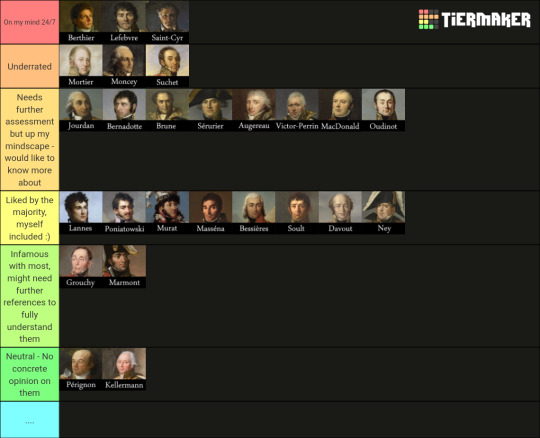
A tier-list of the marshals mainly based on how much I hyperfixate on them. Feel free to drop your own opinions on here :3
Tierlist can be found here!
#napoleons marshals#napoleon’s marshals#napoleonic wars#tagging all 26 hoo boy#louis alexandre berthier#françois joseph lefebvre#laurent de gouvion st cyr#louis gabriel suchet#edouard mortier#bon adrien jeannot de moncey#etienne macdonald#jean baptiste jourdan#claude victor perrin#jean mathieu philibert serurier#guillaume brune#charles pierre augereau#jean baptiste bernadotte#nicolas oudinot#jean lannes#joachim murat#andre massena#jean baptiste bessières#jozef poniatowski#jean de dieu soult#michel ney#louis nicolas davout#auguste de marmont#emmanuel de grouchy#françois christophe de kellermann#catherine dominique de perignon
38 notes
·
View notes
Note
A fun little ask: the Marshalate is informed there is cake in the break room. How do each of them react?
Who ever you are, thank you for this sweet little question and I apologise for my late response. 🙈💕
I have ideas for some of them, however I am **not** aware of the maréchals eating habits so any input is welcome here. Also, I don't know all of the marshals well enough but I will try to include as many as possible. Don’t expect any historical accuracy in this.
See this post as a very big headcanon and as one ongoing story where I am going to try to mimic the marshals characters and miserably fail.
Shall we begin? :D
Les Maréchals and cake
Berthier would hear about it and quietly get excited by the idea of having a nice little piece of cake, just for him to be too busy with everything so that he isn't able to leave his desk. Either this or someone (probably one of his adcs) would be nice enough to get for Berthier his piece of cake.
Murat: You bet he is one of the first ones to look at this cake. His reaction might depend on how the cake looks. If it's a huge cake with a lot of golden details, Murat will carry it around so everyone admires this phenomenal cake because it deserves to be looked at.
Augerau and Masséna wonder why there is such a fancy a cake in the break room in the first place and who might have put it there. Augerau asks Masséna with a low voice: “How much money do you want to bet on the cake being poisoned?” Before Masséna is able to answer, Lannes enters the scene.
Lannes runs after Murat with the cake knife demanding to finally get his damn piece of this cake while Murat can't make himself to cut it because this cake is “so damn beautiful that it would be a waste to eat it.” This little game goes on for a minute or two until the other marshals grow impatient, one of them being Ney.
Ney who is known for his hotheadedness tries to save this cake from a disaster aaaaand fails. :) The three of them dispute over who is the actual culprit of this mess.
L: Murat, what have you done? M: I have done nothing. You followed me with a knife. N: You let the cake fall. M: You intervened in my business with Lannes.
The cake has fallen to the ground as Davout, Suchet and Macdonald watched. “Aaand here goes the cake”, Macdonald says; “At least the floor was able to taste it.” Suchet asks: “What do you think was its flavour?” ”Chocolate vanilla.” Davout answers. After a moment of silence, he adds. “Soult has a good recipe.” Mortier walks in, seeing how Lannes, Murat and Ney are loudly disputing while Masséna and Augerau get themselves black coffee and Davout, Suchet and Macdonald talking. Lefebvre who was walking right behind Mortier gestures him to move away from the door so he can get into the break room: “What is going on?”
Suchet: “We found a cake-“ Davout interrupts him: “We found a chocolate vanilla cake which we don’t know how it got here or if it was poisoned and now it’s inedible because his royal highness, the King of Naples, made it fall.”
Murat shouts from the back: “I didn’t let it fall.” Lannes: “Oh, you did.”
Lefebvre offers a solution like the good fatherly figure he is: “Do you still want cake? We could bake a new cake, messieurs.” Davout replies: “This sounds like a smart idea, Monsieur. Maréchal Soult knows an excellent recipe.”
Lefebvre: “Ahh, excellent. Where is our maréchal?”
Mortier: “He is in his office.”
“Then this where our journey goes next.” Lefebvre slams the door open and accidentally hits Oudinot. “Ah, Monsieur, my apologies. If I had known you were there, I wouldn’t have slammed the door as hard as I did. Are you alright? Yes? Until the next time then.”
Davout walks up to his friend to make sure how Oudinot is doing and explains to him in the meanwhile what is going on and also promises Oudinot to bring him a piece of the cake they are going to bake.
Lefebvre takes the lead and walks straight to Soult’s office while Davout and Mortier follow him. Suchet decides to stay behind while Macdonald thinks about it. Lefebvre knocks on Soult’s office door: “Monsieur, le maréchal? Are you here?” *Lefebvre knocks again with his energetic manner.* “Monsieur, le maréchal, it’s me, Lefebvre. Open the door!*
Soult opens the door with his usual unimpressed demeaner: Hm? Lefebvre: “Excusez-moi, mon maréchal, I heard you have a recipe for a delicious cake?” Soult: Cake? What cake? Davout: The chocolate vanilla one… the one you baked for your daughter Hortense’s birthday. The delicious one. Soult: Ah, yeah. That one. What of it? Mortier: We would like to bake this cake, which is why we want to ask if you mind us borrowing the recipe? Soult stares at his co-maréchals for a second, he shuts the door, opens it again with a piece of paper in his hand which he gives to Lefebvre. “Here. Is there anything else you need?” Macdonald who decided to join the baking group walks up to them and asks Soult: “Would you mind to lend us your baking equipment?” - “No. Have a nice day.” Soult shuts his door while Lefebvre shouts: “Thank you for your help, Monsieur Soult.” Macdonald asks: “What are we going to do now?” “We are going to bake the cake now, my good friend”, Davout answers. Mac: “Where? Where do you want us to bake the cake? Do we have the right ingredients?” D: In the kitchen and I don’t see why we shouldn’t have the ingredients. Macdonald looks at Davout with suspicious eyes about the matter if they are going to manage to bake this cake… The group of maréchals appear in the imperial kitchen where they start to gather the right ingredients. While the group is busy with the preparations, les maréchals Pérignon and Sérurier appear, wondering what is going on. As Lefebvre is explaining these two their baking journey up until now, Pérignon and Sérurier decide to join them: “A cake made by maréchals for maréchals.”
What could possibly go wrong with two additional heads in the kitchen? As it turns out: Everything. Pérignon and Sérurier manage to overdo the cake by confusing salt with sugar. The cake tastes salty, the icing itself is fine because it was made by Davout who religiously followed Soult’s directions. In addition to that, monsieur Lefebvre manages to mix up usual paper with baking sheets.
Bernadotte walks into the kitchen as he sees his fellow maréchals working on their baking project. He comments on the scenery: “This is just pure chaos without any discipline, a chaos which can’t possibly create something edible.” Davout replies “Well, have you ever baked anything in your miserable existence which you so call your life?”; to which Bernadotte says: “wELL, no, BUT-“ Davout continues: “Then get out of this room and give me my peace back or shut up.” Bernadotte decides to leave.
As Bernadotte is leaving, Jourdan walks right into the scene with an apple in his hand. A fire starts to break out in the oven and Jourdan, like the team player he is, turns and leaves this mess to his co-maréchals without saying one word.
Nothing is going as Davout had it planned. He sits in a corner, mourning this beautiful chocolate vanilla cake he had in mind. Macdonald sits right next to him with a spoon, telling him: “Well, at least the frosting you made yourself is delicious.” Davout, completely shattered by the fact that he wasn’t able to make his desired chocolate vanilla cake, puts his face into his palms until a surprise visits the kitchen: It’s maréchal Soult. With a cake. A chocolate vanilla cake. A chocolate vanilla cake which is neither burnt nor oversalted. A chocolate vanilla cake according to the recipe. Next to Soult is Oudinot who cuts two pieces of the cake: one for himself and one for his good old friend, Louis Nicolas Davout.
After Soult, Ney and Lannes enter the kitchen. Ney silently takes a piece of Soult’s cake, saying nothing except a simple “thank you”. So do Macdonald and Mortier. Soult tolerates Ney’s presence. Lannes on the other hand goes straight to the oversalted and burnt cake which the older maréchals made and are also eating. Kellermann and Grouchy, as late to the party as ever, also go for Lefebvre’s bad cake while Soult’s good cake is still sitting there. Soult can’t hide his look of disgust.
At some point, Bessières and Murat join or rejoin retrospectively the scene, walking up to Soult’s cake. Bessières, as well mannered as he is, takes one piece of a cake to which Murat comments: “I know how much you like this lovely type of cake, Bessières, take a second piece.” - “No”, Soult replies: “That’s not your cake. Take your piece and leave.” Murat adds: “For whom are the other pieces then? I don’t see anybody who would possibly want to eat this gorgeous baked good. We want to eat your delicious creation of a fabulous cake.” - “One piece each. You can give him your piece if you like to.” Bessières interrupts the two: “I am content with my piece.” Murat doesn’t listen to what Bessières says and continues his conversation with Soult: “My fellow maréchal, I don’t understand, why do you struggle so much with allowing somebody to have one additional piece of cake than the other ones?”
While Murat and Soult continue their dispute which leads to nowhere, one adc enters slowly the kitchen. He looks at Soult who recognises this man as one of Berthier’s adcs. He came to get a piece of cake for his marshal. Soult lets him take one of the few pieces left. All of a sudden, Kellermann seems to be chocking on his salty cake piece. All the maréchals are gathering around him and in the chaos, the last few pieces of Soult’s cake fall to the ground. Soult looks at his cake or what’s left of it. One could argue that everyone who wanted to eat it was able to eat it. One could argue that these fallen pieces can be ignored and Soult could go on with his day never ever thinking about the pieces again. However, we are talking about maréchal Soult here who sees the art in baking. The love, the accuracy of it. Today he didn’t just bring cake to his fellow maréchals. Today he witnessed how some of them have no sense of dignity for what it means to be able to eat good food. Good cake. Soult is leaving the room, not bothered about Kellermann as he wouldn’t be able to help anyway. He is going to his wife, his Louise Berg, who asks him about his day. He tells her the whole of it. How he was surprised by his fellow maréchals who wanted to bake a cake. How he knew that they are going to mess up his recipe. How he baked that cake properly and how a part of it went to waste. “Some of them ate oversalted and burnt cake. Who eats bad cake? Who likes bad cake???”
Davout on the other hand was thankful for Soult. With a smile on his face, Davout enjoyed his so desired chocolate vanilla cake, unbothered by the event surrounding him. The end. :)
#Napoleonic headcanon#headcanon#napoleonic#louis alexander berthier#joachim murat#charles pierre augerau#andré masséna#jean lannes#michel ney#louis nicolas davout#louis gabriel suchet#étienne macdonald#édouard mortier#nicolas charles oudinot#françois joseph lefebvre#jean baptiste bernadotte#jean baptiste bessières#jean baptiste jourdan#jean de dieu soult#louise berg soult#And the rest :)#i am too tired for this#i hope you like it#cake
67 notes
·
View notes
Text
Pierre Bourdieu – Bir Oto-Analiz İçin Taslak (2023)
Pierre Bourdieu’nün özyaşamöyküsü türüne reddiye olarak yazdığı ‘Bir Oto-Analiz İçin Taslak’, düşünümsel sosyolojinin mimarının kendi toplumsal doğumunu ve izlediği stratejileri ortaya koyduğu, kendini nesneleştirdiği bir elveda mektubu. 2001’de Sosyoloji Bir Dövüş Sanatıdır belgeseliyle Fransa’da meşhur olan Bourdieu’nün belgeselin yayınlandığı yıl kaleme alıp 2002’de –Yüce Fransız Düşüncesi…

View On WordPress
0 notes
Text
Late to the game but I’m adding because why not.
62. Don’t ask Larrey why he came to the treatment he’s using on the wounded. It’s all the right things for all the wrong reasons.
63. It’s not worth being neutral. Believe me, cities have been bombed horrendously for being neutral. If you do plan on it doing it anyways, just beat the British to it and blow up your own ships.
64. If involved in an affair with the Danish king, don’t bother cheating on him or try to run off. You may get exiled. But why should you? He pays well, and any kids with the guy will live richly.
65. Don’t speak badly of religion or the monarchy in Denmark. You may find yourself permanently exiled.
66. Don’t ask the Danish monarch about the lack of mailboxes in his kingdom. Just don’t.
67. What happens Danish officer parties stays in the Officers parties.
68. Please don't put the French and Russian Peacocks in a room. we don't need to watch that.
69. If Larrey needs something, he will tell you, no matter the time it is or what you are doing.
Napoleonic War Survival Tips for the French Army
1. Don’t refer to Marshal Murat’s uniform as “peacock wear” within earshot of him.
2. When Napoleon pulls out a map, don’t ask, “Are we lost?”
3. If your cannonball doesn’t quite reach the enemy lines, just blame the wind. Or Berthier.
4. Don’t accidentally toast “To King Louis” at an officers’ dinner. Ever.
5. Avoid playing cards with Marshal Lannes – unless you enjoy losing your entire month’s pay.
6. Foraging in enemy territory: Always ask what’s in the stew before you eat it.
7. If you’re sent to negotiate peace, don’t open with, “Our emperor said this would be easy.”
8. During winter campaigns, remember: snowballs do not replace musket balls.
9. Don’t try to outdo Napoleon in recalling historical battles. You’ll lose.
10. If Napoleon is inspecting the troops, resist the urge to ask, “Is it true you’re shorter than Murat?”
11. Never, under any circumstances, suggest that Wellington’s redcoats “don’t look so tough.”
12. If Marshal Ney orders a charge, just assume it’s going to last until nightfall.
13. Do not ask Marshal Davout if his nickname Iron Marshal comes from his cooking.
14. If your bayonet charge fails, remember: retreat is just “advancing in the opposite direction.”
15. If someone says “This mission is simple,” expect nothing but complications.
16. In case of defeat, remember: it’s always the Austrians’ fault. Even if they aren’t there.
17. During peace negotiations, “bombing their latrines” is not considered a formal strategy.
18. If you happen to capture a British officer, refrain from gloating by saying, “See you in Paris!”
19. When bivouacked near rivers, don’t bet on crossing without some form of disaster.
20. Finally, do not point the cannons at the Emperor’s tent, even as a joke. Especially not as a joke.
#obligatory add#personal#joachim murat#napoleon bonaparte#napoleonic era#historical#Alexandre Berthier#jean lannes#arthur wellesley#michel ney#louis nicolas davout#andre massena#pierre augereau#jean de dieu soult#jean baptiste bessieres#nicolas charles oudinot#marcellin marbot#louis charles antoine desaix#dominique jean larrey#jean joseph ange d'hautpoul#auguste de marmont#jean baptiste kleber#pierre charles jean baptiste silvestre de villeneuve#jean baptiste bernadotte#édouard mortier#antoine lasalle#etienne marie antoine champion de nansouty#Frederick vi#frederik vi#Alexander I
281 notes
·
View notes
Text
The Napoleonic Marshals’ MBTIs according to Internet
(most of them are probably wrong but I'm 100% sure about my fellow INTJs, especially Soult)
(missing because of lack of information : Brune, Grouchy, Jourdan, Kellerman, Macdonald, Moncey, Pérignon, Sérurier, Perrin)
Pierre Augereau : ESTP Jean-Baptiste Bernadotte/Charles XIV : ENFJ Alexandre Berthier : ISTJ Jean-Baptiste Bessières : ISTJ Laurent Gouvion Saint-Cyr : INTP Louis-Nicolas Davout : INTJ Jean Lannes : ESTP François-Joseph Lefebvre : ENTJ Auguste de Marmont : ENTP André Masséna : ENTP Adolphe Mortier : ISTP Joachim Murat : ESTP Michel Ney : ESTP Nicolas-Charles Oudinot : ESTJ Joseph-Antoine Poniatowski : ISTP Jean-de-Dieu Soult : INTJ Louis-Gabriel Suchet : ENTJ
47 notes
·
View notes
Photo

Napoleon's Italian Campaign
The Italian campaign of 1796-1797, waged by a young Napoleon Bonaparte, was a decisive campaign in the French Revolutionary Wars (1792-1802). It led to the defeat of Austria, the beginning of French control of northern Italy, and the end of the war, but most importantly, it launched Bonaparte himself to new heights of fame and power.
The War of the First Coalition, the first of the Revolutionary Wars, had been ongoing since 1792, fought between the French Republic and a coalition of anti-French powers. Yet most of the fighting had taken place in Flanders and Germany, leaving the Italian front as more of a sideshow. Upon taking command of the Army of Italy in March 1796, Bonaparte would make the Italian theater the most important operation in the war, stunning all of Europe as he beat every Austrian army sent against him and redrew the map of northern Italy. His brilliant campaign led Austria to sue for peace and end the war in October 1797 and made Bonaparte one of the most influential men in France.
To Destiny
On 27 March 1796, General Napoleon Bonaparte arrived in Nice to take command of the French Army of Italy. It had been a whirlwind of a month for the young general, who had received the command on 2 March, only seven days before marrying the attractive Joséphine de Beauharnais. Joséphine was the former mistress of Paul Barras, a member of the French Directory and one of the most powerful men in France, leading to rumors that Bonaparte had only received his command as a favor from Barras to his old paramour. Yet, by this point, Bonaparte had already built a reputation in the French army, having distinguished himself at the Siege of Toulon in 1793 and by crushing the royalist revolt of 13 Vendemiaire in 1795. Whatever the true reasons for his appointment, Bonaparte left for the front after a honeymoon of only 48 hours; as a wedding gift, he left his bride with a golden medallion inscribed with the words 'To Destiny'.
Upon arriving at Nice, General Bonaparte's first order of business was to hold a troop inspection. He was met with a ragged, demoralized force on the point of mutiny. The men were starving and malnourished, given only meager rations provided by corrupt contractors who charged extortionate prices. They lacked the most basic supplies; muskets, bayonets, and uniforms were all rare commodities, and entire battalions went without shoes. The army had not been paid for months, and when pay did arrive, it was in the form of the nearly worthless banknotes called mandats territoriaux, which was all the practically destitute French Directory could provide. Disease, desertion, and battlefield casualties had whittled the army down from an initial strength of 106,000 men in 1792, to only 37,600 men and 60 guns in March 1796, with no new replacements on the way. Bonaparte had his work cut out for him.
Bonaparte was also introduced to his officers, many of whom would become major players in the Napoleonic story. Bonaparte's chief of staff was Alexandre Berthier, an administrative genius whose ability to work 20-hour days and keep up with Bonaparte's rapid-fire orders kept the army's staff running like clockwork. The division commanders included Jean Sérurier, a gloomy general with 34 years of experience in the old Royal Army; Pierre Augereau, a former mercenary, dancing master, and duelist, who once killed an officer over an insult; and André Masséna, a talented general whose appetites for loot were only matched by his lust for women. Other soon-to-be famous officers under Bonaparte's command included Joachim Murat, Jean-Andoche Junot, Jean Lannes, Barthélemy Joubert, and Auguste Marmont. As David G. Chandler notes, "rarely had such a galaxy of military talent served together at one time and place" (57).
At first, these officers were unimpressed with their new commander-in-chief. At only 26, the short and wiry Bonaparte "looked more like a mathematician than a general", and the pleasure he took in showing off the portrait of his new wife made him seem juvenile. The generals would soon realize they had underestimated him. Immediately, Bonaparte reorganized the commissariat and threatened the venal contractors. He recalled the cavalry from winter quarters and quietly secured a loan of 3 million francs from Genoese financiers. He reintroduced discipline by disbanding mutinous battalions and court-martialing two officers for singing anti-revolutionary songs. Within days, Bonaparte had won the respect of his subordinates; as Masséna famously remarked, Bonaparte "donned his general's cap and seemed to grow by two feet" (Roberts, 75).
Bonaparte next tried to win over the rank-and-file soldiers, promising them the victories and riches that had hitherto only been afforded to their comrades in Germany and Flanders:
Soldiers! You are hungry and naked; the government owes you much but can give you nothing. The patience and courage you have displayed among these rocks are admirable, but they give you no glory-not a glimmer falls upon you. I will lead you into the most fertile plains on earth. Rich provinces, opulent towns, all shall be at your disposal ... soldiers of Italy! Will you be lacking in courage or endurance?
(Chandler, 53)
It was a bold promise, especially for a general who was yet to lead an army into battle. On 10 April, five days before Bonaparte intended to launch his campaign, he received word that 53,000 Austrian and Piedmontese troops were already bearing down upon him. The time had come for Bonaparte to meet his destiny.
Continue reading...
34 notes
·
View notes
Text

1 note
·
View note
Text
Friends, enemies, comrades, Jacobins, Monarchist, Bonapartists, gather round. We have an important announcement:
The continent is beset with war. A tenacious general from Corsica has ignited conflict from Madrid to Moscow and made ancient dynasties tremble. Depending on your particular political leanings, this is either the triumph of a great man out of the chaos of The Terror, a betrayal of the values of the French Revolution, or the rule of the greatest upstart tyrant since Caesar.
But, our grand tournament is here to ask the most important question: Now that the flower of European nobility is arrayed on the battlefield in the sexiest uniforms that European history has yet produced (or indeed, may ever produce), who is the most fuckable?
The bracket is here: full bracket and just quadrant I
Want to nominate someone from the Western Hemisphere who was involved in the ever so sexy dismantling of the Spanish empire? (or the Portuguese or French American colonies as well) You can do it here
The People have created this list of nominees:
France:
Jean Lannes
Josephine de Beauharnais
Thérésa Tallien
Jean-Andoche Junot
Joseph Fouché
Charles Maurice de Talleyrand
Joachim Murat
Michel Ney
Jean-Baptiste Bernadotte (Charles XIV of Sweden)
Louis-Francois Lejeune
Pierre Jacques Étienne Cambrinne
Napoleon I
Marshal Louis-Gabriel Suchet
Jacques de Trobriand
Jean de dieu soult.
François-Étienne-Christophe Kellermann
17.Louis Davout
Pauline Bonaparte, Duchess of Guastalla
Eugène de Beauharnais
Jean-Baptiste Bessières
Antoine-Jean Gros
Jérôme Bonaparte
Andrea Masséna
Antoine Charles Louis de Lasalle
Germaine de Staël
Thomas-Alexandre Dumas
René de Traviere (The Purple Mask)
Claude Victor Perrin
Laurent de Gouvion Saint-Cyr
François Joseph Lefebvre
Major Andre Cotard (Hornblower Series)
Edouard Mortier
Hippolyte Charles
Nicolas Charles Oudinot
Emmanuel de Grouchy
Pierre-Charles Villeneuve
Géraud Duroc
Georges Pontmercy (Les Mis)
Auguste Frédéric Louis Viesse de Marmont
Juliette Récamier
Bon-Adrien Jeannot de Moncey
Louis-Alexandre Berthier
Étienne Jacques-Joseph-Alexandre Macdonald
Jean-Mathieu-Philibert Sérurier
Catherine Dominique de Pérignon
Guillaume Marie-Anne Brune
Jean-Baptiste Jourdan
Charles-Pierre Augereau
Auguste François-Marie de Colbert-Chabanais
England:
Richard Sharpe (The Sharpe Series)
Tom Pullings (Master and Commander)
Arthur Wellesley, 1st Duke of Wellington
Jonathan Strange (Jonathan Strange & Mr. Norrell)
Captain Jack Aubrey (Aubrey/Maturin books)
Horatio Hornblower (the Hornblower Books)
William Laurence (The Temeraire Series)
Henry Paget, 1st Marquess of Anglesey
Beau Brummell
Emma, Lady Hamilton
Benjamin Bathurst
Horatio Nelson
Admiral Edward Pellew
Sir Philip Bowes Vere Broke
Sidney Smith
Percy Smythe, 6th Viscount Strangford
George IV
Capt. Anthony Trumbull (The Pride and the Passion)
Barbara Childe (An Infamous Army)
Doctor Maturin (Aubrey/Maturin books)
William Pitt the Younger
Robert Stewart, 2nd Marquess of Londonderry (Lord Castlereagh)
George Canning
Scotland:
Thomas Cochrane
Colquhoun Grant
Ireland:
Arthur O'Connor
Thomas Russell
Robert Emmet
Austria:
Klemens von Metternich
Friedrich Bianchi, Duke of Casalanza
Franz I/II
Archduke Karl
Marie Louise
Franz Grillparzer
Wilhelmine von Biron
Poland:
Wincenty Krasiński
Józef Antoni Poniatowski
Józef Zajączek
Maria Walewska
Władysław Franciszek Jabłonowski
Adam Jerzy Czartoryski
Antoni Amilkar Kosiński
Zofia Czartoryska-Zamoyska
Stanislaw Kurcyusz
Russia:
Alexander I Pavlovich
Alexander Andreevich Durov
Prince Andrei (War and Peace)
Pyotr Bagration
Mikhail Miloradovich
Levin August von Bennigsen
Pavel Stroganov
Empress Elizabeth Alexeievna
Karl Wilhelm von Toll
Dmitri Kuruta
Alexander Alexeevich Tuchkov
Barclay de Tolly
Fyodor Grigorevich Gogel
Ekaterina Pavlovna Bagration
Ippolit Kuragin (War and Peace)
Prussia:
Louise von Mecklenburg-Strelitz
Gebard von Blücher
Carl von Clausewitz
Frederick William III
Gerhard von Scharnhorst
Louis Ferdinand of Prussia
Friederike of Mecklenburg-Strelitz
Alexander von Humboldt
Dorothea von Biron
The Netherlands:
Ida St Elme
Wiliam, Prince of Orange
The Papal States:
Pius VII
Portugal:
João Severiano Maciel da Costa
Spain:
Juan Martín Díez
José de Palafox
Inês Bilbatua (Goya's Ghosts)
Haiti:
Alexandre Pétion
Sardinia:
Vittorio Emanuele I
Lombardy:
Alessandro Manzoni
Denmark:
Frederik VI
Sweden:
Gustav IV Adolph
65 notes
·
View notes
Text
Since that's all I have to do with my life, I decided to rank the marshals according to their popularity: the stars, the well know, the okay ones, the unknow ones and the who they are ?
(this is my opinion of cours)
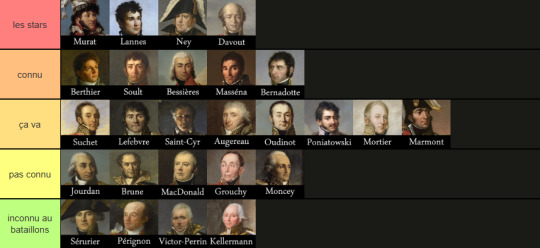
#history#napoleon's marshals#napoleonic era#french history#michel ney#jean de dieu soult#louis nicolas davout#jean lannes#joachim murat#louis gabriel suchet#louis alexandre berthier#jean baptiste jourdan#jean mathieu philibert sérurier#jean baptiste bessières#jean baptiste bernadotte#andre massena#catherine dominique perignon#francois joseph lefebvre#claude victor perrin#françois christophe kellermann#etienne macdonald#emmanuel grouchy#guillaume brune#bon adrien jeannot moncey#nicolas charles oudinot#joseph antoine poniatowski#pierre augereau#auguste de marmont#edouard mortier#laurent gouvion saint cyr
48 notes
·
View notes
Note
What is the Napoleonic character you hate?
In particular, I hate Murat and Ney. They have a lot of publicity but in reality they were mediocre soldiers. They are only famous for their beautiful portraits.
If Davout had been handsome, he would have been the most famous marshal.
(I really wonder: is there even a way to answer this without getting myself into trouble again?)
I try not to hate. Really. I also try not to love. I.e., I don't want to let the fact that I'm fond of one historical character more than of others get in the way of treating them fairly. But I'm only human, of course I have preferences, and I'm sure they influence me without me even realizing.
At the very least, I try to not hate the person but rather specific actions or character traits that do not quite agree with me.
So, why do I like Eugène? Mostly because, according to a vast majority of sources, he was
kind, friendly, sociable and good-natured to such a high degree that it set him apart from others
modest and unambitious (i.e., not a braggart or dazzler promising more than he can deliver, nobody to claim other people's laurels for himself)
reliable and much tougher than he looked, able to withstand a lot and to pull through, somehow managing even truly hard tasks (Pierre Branda, who does not like him, at one point calling him "unmoved like marble")
Obviously, I tend to dislike the opposites of these features then. Also obviously, military talent or lack thereof does not play the slightest role in my evaluation system 😊. If so, Eugène surely could not rank very high.
But I do dislike Hortense for her ambitions (which she, to be fair, in her memoirs denies she had), and for emphasising her role at the expense of others, for badmouthing them while lying about herself to make herself look better.
I've also come to dislike Junot recently, though this is mostly based on me discovering Laure's "journal intime". And I think what I truly hate regarding this is the fact that this testimony - by a woman who claims to have been assaulted by her husband and put through a several-hours-long nightmare - has been disregarded, ridiculed and scoffed at by several generations of (male) historians now. I mean, if it's possible to prove that Laure is lying in it, please go ahead and do it, I'll be happy to change my opinion. But instead, this source is just not taken serious, hidden within an opus called "The unknown novel of the Duchess d'Abrantès", already implying it may be fictional, with both Chantemesse and especially Joseph Turquan being only interested in belittling the woman and in talking about her affair with Balincourt. Obviously, her sleeping with that guy in 1813 is much more scandalous than her husband stabbing and strangling her in 1810...
Overall I tend to think that in most cases, when I dislike somebody, this tends to change a bit as soon as I learn more about them. It was true for both Ney and Murat, though much more for the latter.
Thanks for the Ask! (and I really hope I did not offend anybody).
11 notes
·
View notes
Text
Napoleonic Halloween Party — Greek Gods And Goddesses Edition✨
Remember that way back then I made Napoleonic Halloween Party costume assignments for Napoleonic era figures? Well, now is time for another assignment, this time with an overarching theme — Greek Gods And Goddesses 😏😉✨
And here goes...
Napoleon Bonaparte: Zeus
Josephine Bonaparte: Hera
Geraud Duroc: Ganymede
Pauline Bonaparte: Aphrodite
Louis Alexandre Berthier: Castor
Jean Baptiste Bessieres: Polydeukes
Elisa Bonaparte: Athena
Joachim Murat: Hades
Caroline Murat: Persephone
Letizia Bonaparte: Demeter
Jean Lannes: Thanatos
Michel Ney: Moros
Aglae Ney: Elpis
Andre Massena: Hermes
Dominique Jean Larrey: Asclepius
Louis Nicolas Davout: Ares
Aimée Davout: Artemis
Nicolas Oudinot: Hephaestus
Laurent Gouvion St Cyr: Apollo
Pierre Augereau: Kratos
Jean Baptiste Bernadotte: Deimos
Jean De Dieu Soult: Hypnos
A portrait of Suffren: Poseidon
Pyotr Bagration: Dionysus
#not art#scribblings#it's crack o'clock folks#dhfhhfjf I haven't found anyone suitable for berthier I'm so sorry 😩#though in the end this is based more on vibes than anything 🤪#halloween#napoleon#first french empire#i keep all the gods from one(1) empire#except dionysus because no matter the empire petya has to be dionysus 🤣#napoleon bonaparte#josephine bonaparte#jean lannes#joachim murat#michel ney#trio kwek kwek#laurent de gouvion st cyr
19 notes
·
View notes